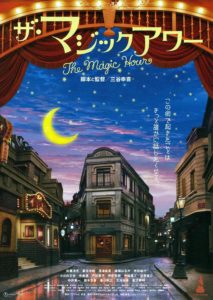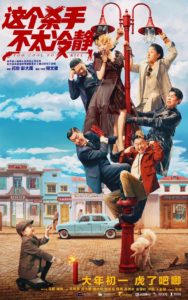Too Cool to Kill
这个杀手不太冷静
China, 2022, colour, 2.35:1, 109 mins.
Director: Xing Wenxiong 邢文雄.
Rating: 5/10.
Loose adaptation of Japanese comedy The Magic Hour is Ma Hua FunAge’s weakest production to date, only ever firing on one cylinder.
Lying Town. Big boss Hawei (Chen Minghao) is clipped in the ear by a bullet and gets the idea, from a shell found on the ground, that it was the work of legendary assassin Karl (Ai Lun), even though Karl is reputed never to miss his target. Hawei instructs his men to find Karl at all costs, so they can meet and talk. The only problem is that no one knows what Karl looks like. Hawei visits the set of a war film he’s financing that stars well-known actress Mi Lan (Ma Li), whom Hawei lusts after, and is directed by her younger brother Mi Le (Huang Cailun). Sensing an opportunity for her and Mi Le finally to get out of town and away from Hawei, Mi Lan deliberately lets slip that she knows Karl, as he’s a fan of hers. Suspicious, Hawei tells her he wants to meet Karl the next day. Mi Lan gets the idea of using Wei Chenggong (Wei Xiang), an over-ambitious bit-part player whom Mi Le has just sacked, to impersonate Karl by telling him he’s got the lead role in a film about an assassin that another crew is due to start shooting tomorrow. At a local hotel Mi Lan and Mi Le tell him it’s being shot in a revolutionary way, with no script, hidden cameras and crew, and the actors themselves creating the story. Wei Chenggong eagerly accepts, and next day he goes to meet Hawei with Mi Lan and Mi Le guiding him through the “scene”. Wei Chenggong throws himself into the role as the cool killer, and just about manages to convince Hawei and his gang that he is the legendary Karl. But then, after hearing that Karl grew up in Italy, Hawei asks him him to act as interpreter in a meeting between his deputy, Jimi (Zhou Dayong), and an Italian gang boss (Gianluca Zoppa) – which predictably ends in chaos. Meanwhile, Mi Lan and Mi Le get ready to steal aboard a fishing boat the next day. But when the time comes to leave, Mi Lan feels she owes Wei Chenggong an explanation, as she has come to quite like him. Things are further complicated by the arrival of Wei Chenggong’s mother (Zhang Jianxin) and blind father (Zhang Zhizhong) to celebrate their son’s belated success in his acting career.
REVIEW
Beijing comedy troupe Ma Hua FunAge 开心麻花 comes up with CNY hit Too Cool to Kill 这个杀手不太冷静, in which a pain-in-the-neck bit player is cast as a legendary hitman in a “film” he doesn’t realise is real life. It’s the first feature by writer-director Xing Wenxiong 邢文雄, who has over a dozen theatre productions under his belt during the past 15 years. More to the point, the creative producers are Yan Fei 闫非 and Peng Damo 彭大魔, the Ma Hua brains behind the the troupe’s earlier film hits Goodbye Mr. Loser 夏洛特烦恼 (2015)  and Hello Mr. Billionaire 西虹市首富 (2018). Like several Ma Hua movies (Billionaire; Hello, Mrs. Money 李茶的“姑妈”, 2018), Too Cool is inspired by other material – and that’s where its main problem lies. In this case it’s the 2008 Japanese comedy The Magic Hour ザ・マジックアワー (see poster, left), written and directed by Mitani Koki 三谷幸喜, whose roots are also in the theatre and whose works require careful handling, not the hack job here. The result is Ma Hua’s weakest movie to date – though Mainland audiences have flocked, making it the second biggest CNY attraction (after The Battle at Lake Changjin II 长津湖之水门桥), with a very hunky RMB2.2 billion in its first 16 days. [Final tally was RMB2.62 billion, placing it second among the five live-action CNY attractions.]
and Hello Mr. Billionaire 西虹市首富 (2018). Like several Ma Hua movies (Billionaire; Hello, Mrs. Money 李茶的“姑妈”, 2018), Too Cool is inspired by other material – and that’s where its main problem lies. In this case it’s the 2008 Japanese comedy The Magic Hour ザ・マジックアワー (see poster, left), written and directed by Mitani Koki 三谷幸喜, whose roots are also in the theatre and whose works require careful handling, not the hack job here. The result is Ma Hua’s weakest movie to date – though Mainland audiences have flocked, making it the second biggest CNY attraction (after The Battle at Lake Changjin II 长津湖之水门桥), with a very hunky RMB2.2 billion in its first 16 days. [Final tally was RMB2.62 billion, placing it second among the five live-action CNY attractions.]
Mitani’s ensemble comedies, like Welcome Back, Mr. McDonald ラヂオの時間 (1997), The Uchoten Hotel THE 有頂天ホテル (2006) and The Magic Hour, are as finely-calibrated as a Swiss watch, relying on timing and ensemble as much as the words, and any adaptor fiddles with them at his peril. Xing has gone at the original with a chainsaw, so much so that it qualifies more as a film inspired by Mitani’s rather than a simple Chinese remake. While retaining the central idea of an unknown actor being “cast” as a legendary assassin in a fake film, and setting the whole thing in a Never Never Land that looks like the backlot of a period European movie, Xing has completely changed the set-up, and thereby a lot of the character motivation.
In Mitani’s film, a young gangster bluffs his way out of being caught with his boss’ mistress by saying he knows a famous hitman whom no one has ever seen; a friendly waitress comes up with the idea of using an unknown actor to impersonate him. In Xing’s version, the boss demands to meet the hitman after being winged by one of his bullets; an actress he fancies in a film he’s funding has the idea of using an ambitious but stupid bit-player to fool the boss and thus get out of town (and the boss’ clutches) along with her film director brother. As a result of the changes, there simply isn’t the same web of emotions binding the characters together. And where the Japanese original benefited from being completely set in a large hotel and the street outside – both with a suitably unreal, backlot look – Xing’s version, though looking equally fake and filmy (a vaguely Mediterranean fishing village), moves around much more and feels much less contained and atmospheric.
The other big problem is that the lead is played by Wei Xiang 魏翔, a likeable enough character actor who’s been around for years (including Ma Hua movies) and has finally, rather like his character, got his first lead role at the ripe old age of 42. He’s okay in the part but doesn’t bring anything extra to it, and hardly keeps his head above a strong surrounding cast, including Ma Li 马丽 as the scheming actress, Huang Cailun 黄才伦 as her director brother, Chen Minghao 陈明昊 as the Big Boss, and Zhou Dayong 周大勇 as his towering sidekick. One has only to imagine in the role a major Ma Hua name like Shen Teng 沈腾 (who’s also teamed well with Ma in the past) to see how much subtler the comedy and parody could have been.
Though Ma – currently China’s busiest actress, with three releases in early 2022 and a shedload of titles waiting in the wings – is very good at straightfaced comedy and all the deception, she’s almost acting in a vacuum, surrounded by Wei’s low wattage on the one hand and Huang’s manic acting on the other. As a result, Too Cool lacks comedic momentum and just sits there for long stretches. A parody of the title number from Singin’ in the Rain (1952), with Wei hoofing the Gene Kelly part, looks like it was thrown in out of desperation.
Technically the film is fine, with good-looking art direction by Wang Shuo 王硕 (Billionaire), handsome widescreen photography by Gao Hu 高虎 (The Winners 大赢家, 2020), and an above-average score by the experienced Peng Fei 彭飞 that is as attentive as possible to the shifting moods. For the record, the film’s Chinese title is a pun on that for the 1994 French film Léon, with the character 静 added at the end – thereby changing the meaning from “This Killer’s Not So Cold” to “This Killer’s Not So Cool”. Léon is an especially popular film with Chinese audiences.
CREDITS
Presented by New Classics Pictures (CN), Slinky Town Pictures (CN), Beijing Fun Age Pictures (CN), Tianjin Maoyan Weiying Cultural Media (CN), Tianjin Yuewen Media (CN), Tencent Pictures Culture Media (CN).
Script: Xing Wenxiong. Original script: Mitani Koki. Photography: Gao Hu. Editing: Huang Shang. Music: Peng Fei. Art direction: Wang Shuo. Styling: Fu Lei. Sound: Yang Jiang, Zhao Nan. Visual effects: Li Geng. Executive direction: Qian Ru.
Cast: Ma Li (Mi Lan, actress), Wei Xiang (Wei Chenggong), Chen Minghao (Hawei, big boss), Zhou Dayong (Jimi/Jimmy, boss’ deputy), Huang Cailun (Mi Le, film director), Gao Haibao (film director in street), Han Xiao (Jierui/Jerry), Ai Lun (Karl, assassin), Sun Guiquan, Quan Rongbiao, Xu Meng, Bu Junnan (Hawei’s bodyguards), Zhang Zhizhong (Wei Chenggong’s father), Zhang Jianxin (Wei Chenggong’s mother), Ma Chi (driver), Tao Liang (doctor), Gianluca Zoppa (Italian gangster).
Release: China, 1 Feb 2022.
